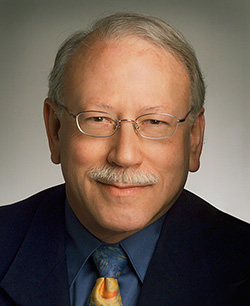The American Physical Society (APS) has announced that Joel Primack, distinguished professor of physics at UC Santa Cruz, will receive the 2016 Leo Szilard Lectureship Award.
The award recognizes Primack "for a crucial role in establishing the Congressional Science and Technology Policy Fellowships." The Leo Szilard Lectureship Award recognizes outstanding accomplishments by physicists in promoting the use of physics for the benefit of society in such areas as the environment, arms control, and science policy. The honoree's lecture at an APS meeting is intended to increase the visibility of those who have promoted the use of physics for the benefit of society.
A leader in particle astrophysics and cosmology, Primack helped create the now-standard Cold Dark Matter theory of galaxy and cosmic large-scale structure formation. In 1988, he became an APS Fellow "for pioneering contributions to gauge theory and cosmology," and in 1999 he received a Humboldt Research Award. He and his wife, Nancy Ellen Abrams, have written two popular books on modern cosmology and its relevance to the world.
Primack has also long been a leader in science and technology policy. He co-authored with Frank von Hippel the book Advice and Dissent: Scientists in the Political Arena (1974), and he worked with von Hippel and Senator Ted Kennedy to create the NSF Science for Citizens program. He helped initiate the APS program of studies on public policy issues in 1974 and co-authored with Freeman Dyson the proposal for the APS Nuclear Reactor Study. Primack helped organize the APS Forum on Physics and Society, and he shared the 1977 Forum on Physics and Society Award with von Hippel. He chaired the Forum in 2005.
In 1988, Primack led the Federation of American Scientists program on space nuclear reactor arms control and helped stop the launching of Soviet reactor-powered satellites. In 2004, as a member of the APS Panel on Public Affairs, he organized and chaired the committee that wrote a critical APS report on President Bush's Vision for Space Exploration.
Primack also started the program on Science and Human Rights at the American Association for the Advancement of Science (AAAS). In 1995, he was made a Fellow of the AAAS "for pioneering efforts in the establishment of the AAAS Congressional Science Fellows Program and for dedication to expanding the use of science in policymaking throughout government." He chaired the AAAS Committee on Science, Ethics, and Religion from 2000 to 2002.
Primack earned a bachelor's degree in physics at Princeton University and Ph.D. in physics at Stanford University. He joined the UC Santa Cruz faculty in 1973.



